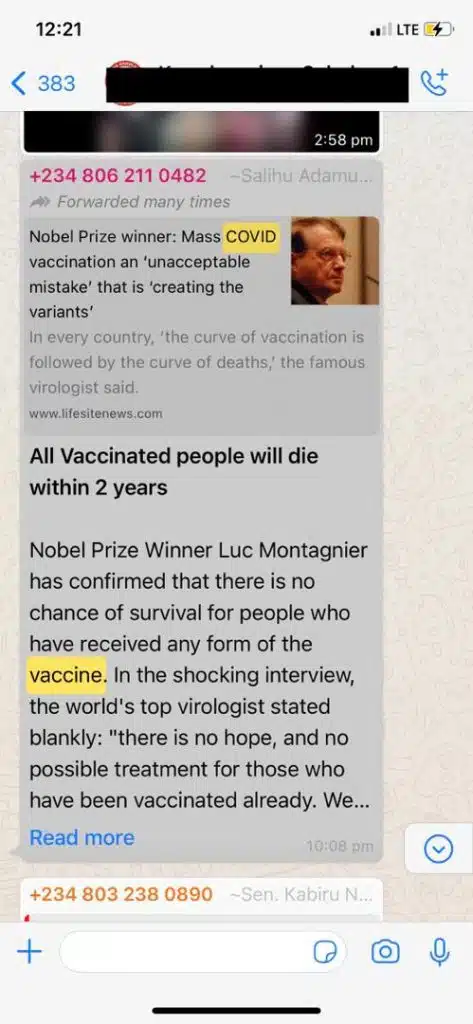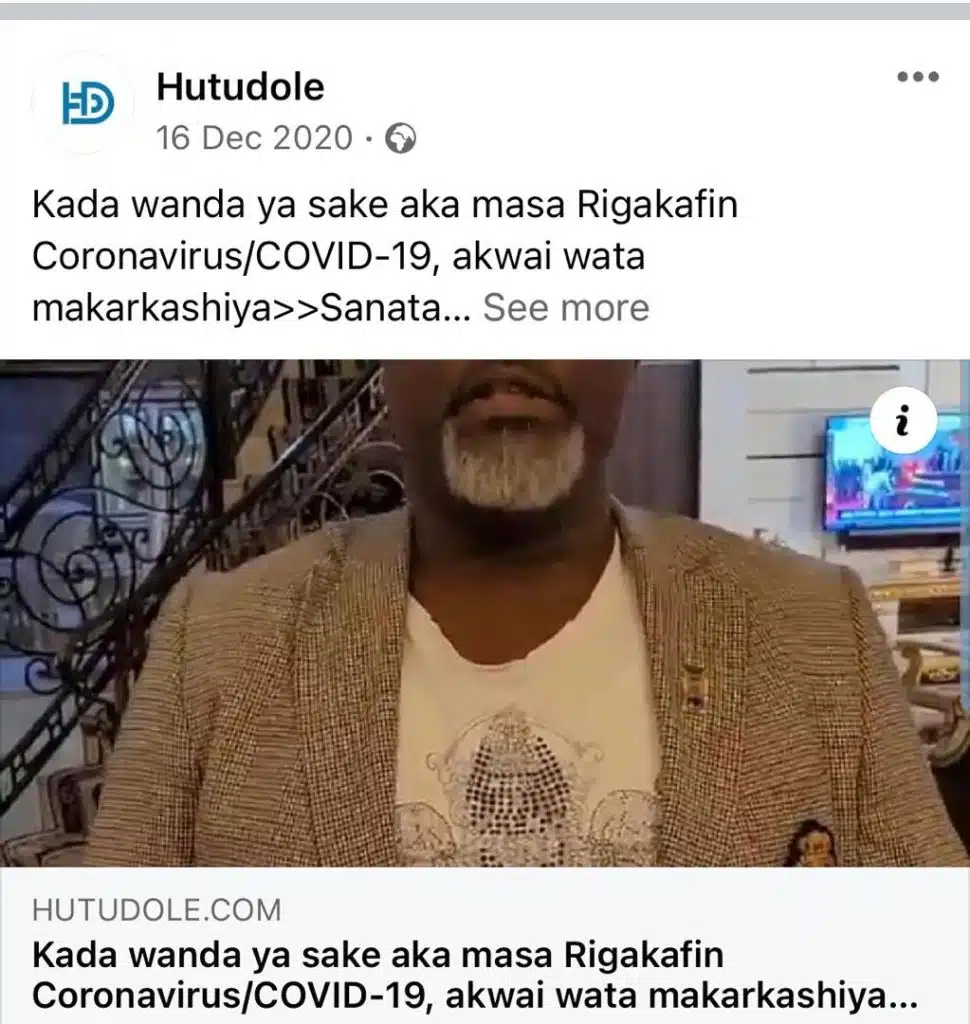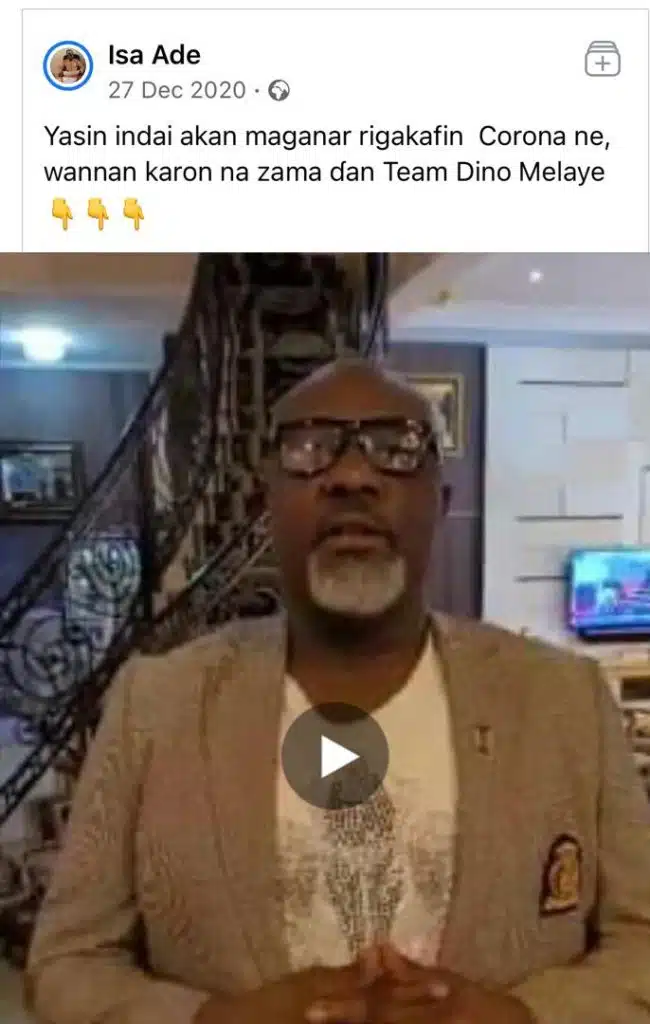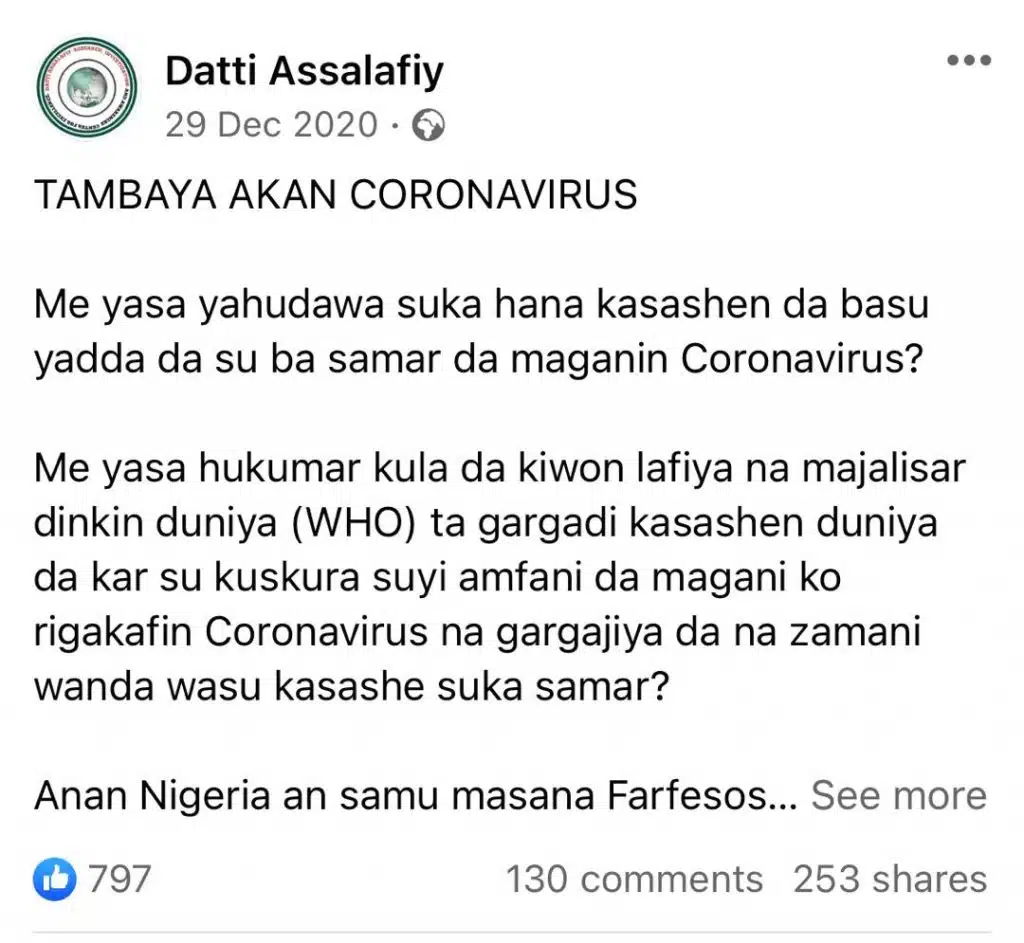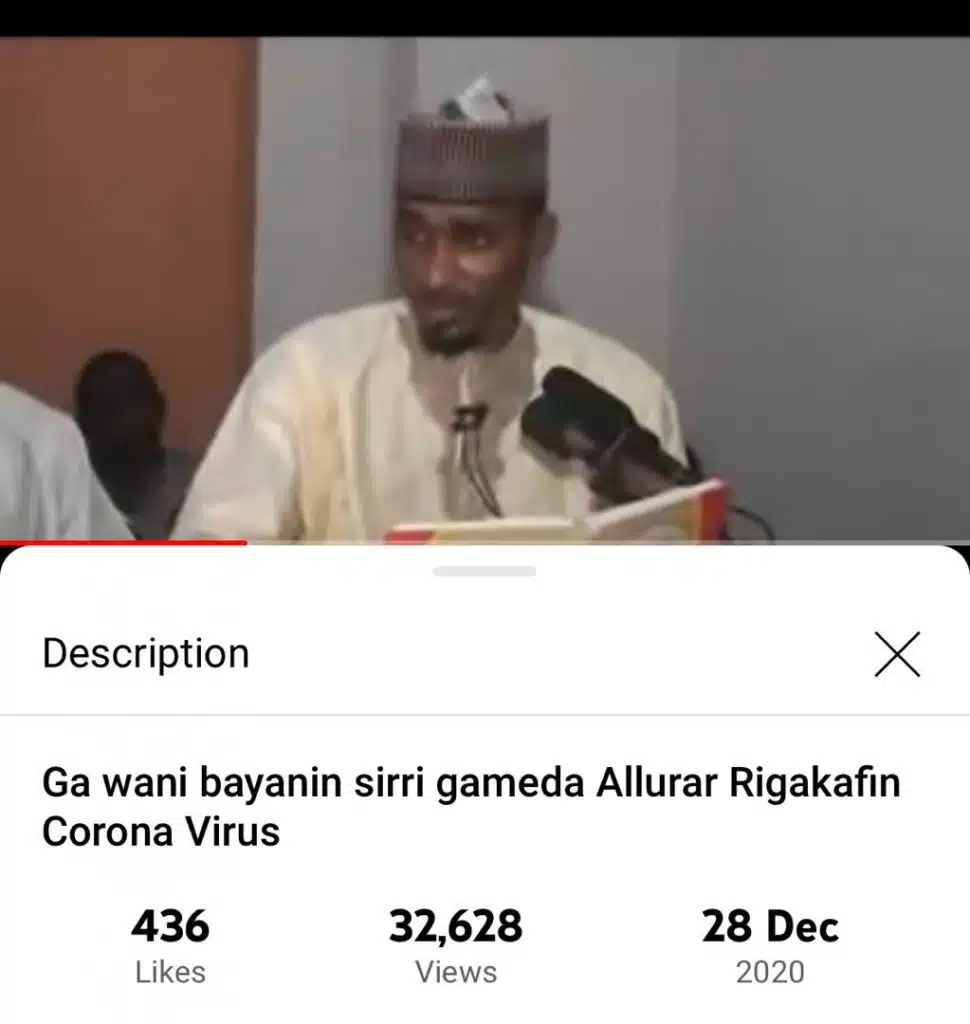
Photo: A street in Kano. Source: CFR
By Aliyu Dahiru
The COVID-19 vaccination has elicited a mixture of excitement and trepidation from residents in Kano State, Northwest Nigeria. However, a considerable section of Kano’s populace continues to be skeptical of the vaccination because of the misinformation they got about the COVID-19 vaccination.
There has been an abundance of information otherwise known as “Infodemic” since the outbreak of the COVID-19 epidemic, with practically every media outlet covering the latest developments.
Traditional and social media information channels share vaccination information and have been quite important in shaping public opinion on whether or not people want to be vaccinated.
Online forums, blogs, and social media have all played a role in developing vaccine apprehension, said Idris Muhammad, a university lecturer who worked on how social media exacerbated COVID-19 misinformation in Kano State.
“This is not the first time merchants of fake news spread false information concerning the vaccine of any disease in Nigeria, but they got a new tool now,” he said.
“If you trace it back to when there was the outbreak of polio in Northern Nigeria, people were spreading false information on why the vaccine was unsafe, but the messages didn’t spread faster than they do today,” he added.
Several researchers have looked into how social media platforms contribute to vaccine hesitancy by emphasising personal narratives over fact and linking anti-vaccination themes to larger belief systems.
COVID-19 vaccination in Nigeria
According to a letter seen by Reuters on Tuesday, June 22, 20201, Nigerian President Muhammadu Buhari had requested the National Assembly to approve an extra-budgetary provision of 895.8 billion naira ($2.18 billion) to support the procurement of COVID-19 vaccinations and military equipment.
The government stated that it would prepare an extra budget to cover the expense of COVID-19 vaccinations, which were not included in the December finance bill for 2021.
COVAX, a program co-led by Gavi, the Vaccine Alliance, the World Health Organisation (WHO), and the Coalition for Epidemic Preparedness (CEPI) to enhance equitable vaccine access for low- and middle-income countries, has initially sent nearly four million doses of the AstraZeneca vaccine to Nigeria from India.
According to a government official, Tolu Ogunlesi, Nigeria expected another 40 million vaccination doses from the African Union (AU) by the end of April.
The African Union had reached an agreement with Johnson & Johnson to secure 400 million doses of its single-dose vaccine starting in July 2021, and Nigeria will be among the beneficiaries.
According to the WHO, the receipt of the vaccine represented a historic step toward the aim of ensuring fair distribution of COVID-19 vaccinations globally, in what was the world’s largest vaccine procurement and supply operation.
The vaccine doses received by Nigeria were distributed based on the rate of infections in each state of the country. Therefore, states with greater infection rates, such as Lagos, Abuja, and Kano, were prioritised in vaccine delivery.
Since then, many Nigerians, particularly those in Kano State, have refused to be vaccinated for various reasons, putting a roadblock to achieving herd immunity in the country.
Misinformation and conspiracy theories have circulated in WhatsApp groups claiming the virus was designed as a government bioweapon and that 5G cellular networks caused it.
However, a fact-check by Reuters has shown the claims are untrue. According to the fact-check, “The majority of virologists and infectious disease experts say the new virus is most likely to have evolved naturally.” Researchers have concluded that the virus is neither artificial nor genetically modified.
According to available data, less than 1 per cent of Nigeria’s total population was vaccinated, with barely 0.1 per cent fully vaccinated after receiving the second dose of the vaccine.
With less than 1 per cent fully immunised, Nigeria faces the biggest danger of a new COVID-19 pandemic. According to specialists, a country must vaccinate at least half of its population to achieve herd immunity against less infectious diseases.
According to scientists, the highly infectious nature of COVID-19 necessitates vaccinating between 80 and 90 per cent of the population before claiming herd immunity in a country.
However, Nigeria has not yet achieved zero COVID-19 infection or taken any steps toward perfecting mass immunization. Nevertheless, the positive cases have decreased due to the lower level of COVID-19 testing, with people returning to their daily routines, wearing no face masks.
Nigeria had nearly 170,000 total positive COVID-19 cases as of June 27, 2021, with 4,000 cases in Kano State alone. The figure is expected to rise as cases are continually found. According to the Nigeria Centre for Disease Control (NCDC), 110 people infected with Kano virus have died, while 22 others are still being treated in hospitals.
Abdullahi Ganduje, Governor of Kano, took his second COVID-19 vaccination on May 21, 2021. He asked medical personnel, traditional authorities, and religious clerics to help make the immunization campaign a success.
“I just took my second dose of the vaccine. So I am appealing to the people of this state to make themselves available for the vaccine,” the governor said.
Only about 100,000 persons in Kano State’s estimated 20 million population received the first dosage of the vaccine. This means that more than 99 per cent of Kano’s population is yet to be vaccinated.
Misinformation discouraging vaccination in Kano State
A substantial percentage of people in Kano State are unprepared to receive the vaccine, an investigation revealed. According to an online poll, almost 54.7 per cent of Kano respondents declared they would not take the vaccine.
When asked why they didn’t get the vaccine, 31.7 out of the 54.7 per cent indicated they didn’t think the virus existed. The remaining 23 per cent claimed that because the virus isn’t as deadly as expected, they didn’t need to get the vaccine. Only 45.3 per cent said they were ready to take the vaccine.
Some of the residents have argued that the vaccination is hazardous and that it was developed to diminish the African population. However, this claim has been debunked as false because the vaccine is not only being used in Africa. Several countries from different parts of the world are taking the vaccine. In the United States, over 320 million doses were given to citizens, with about half of its population fully vaccinated.
Some believed the vaccine had a nano-chip that could be inserted into people’s bodies to track them and infringe on their privacy. But there is no evidence to back up the claim. Available information has shown that only vaccine syringes could contain microchips to differentiate them from fake vaccines, but no one will be injected with the chip.
The proliferation of incorrect and misleading information on social media helped significantly to the installation of terror in the hearts of the locals.
The majority of the false materials disseminated to Kano residents were not originally written in Hausa – the most common local dialect in the state. Instead, many of them were copied from English-speaking forums and blogs and translated into Hausa by persons who knew the language and could communicate the message to local audiences.
Those messages reverberate in echo chambers among the WhatsApp and Facebook groups, Twitter followings and YouTube accounts, mostly in Hausa languages.
Attempts to use Open Source Intelligence Tools (OSINT) like Hoaxy to map a link between false messages spread by social media influencers and how they were received were unsuccessful due to the suspension of Twitter in Nigeria.
However, the messages of politicians, particularly those from Kogi State, who propagated misinformation that was widely circulated and had a catastrophic impact on Kano residents, were mostly in English.
Yahya Bello, the Governor of Kogi State, and Dino Melaye, a former Nigerian legislator from the state, were among those whose misleading and inaccurate utterances drew widespread notice and translations.
Dino Melaye, who is a leading anti-vaccine social media user whose anti-vaccine messages have spread across Nigeria, has been tweeting about immunization against the new coronavirus since late 2020, most of which are false.
Over a dozen tweets containing misleading information about vaccination were tracked to Melaye using the Tweetdeck “tweet content” tool and a keyword search of “COVID-19” and “vaccine.”
According to Dubawa, one of Nigeria’s leading fact-checking platforms, Melaye’s conjectural tweets on vaccination have real-life consequences, particularly after local online newspapers re-distributed the messages.
Photo: screenshot from the translated anti-vaccine message from Dino Melaye.
Several Hausa Facebook users claimed that Dino Melaye’s anti-vaccine statements affected their decision to reject the vaccination. The former legislator, who has also lived in Kano State, has a mastery of the Hausa language.
Photo: A Facebook user endorsing Dino Melaye’s anti-vaccine misinformation
Melaye’s comments had the authority to many, even when the virus was discovered because he had over two million Twitter followers and over 700,000 Facebook likes.
Melaye also released a song called “Say No to COVID-19 Vaccine,” which lasted about one minute and fifty seconds. He began by urging Africans, particularly Nigerians, to refuse to accept any vaccine.
“I am calling on African leaders not to allow Africans to be used as guinea pigs by developed nations for their satanic reasons,” he had said.
“We say no to the application of any vaccine in Africa. We call on the Minister of Health of the Federal Republic of Nigeria to immediately discontinue the interaction with those who want to give us vaccines.”
However, Melaye’s statements are false and incorrect. Africans are not being used as testing objects for the vaccine. As pointed above, billions of people worldwide are receiving the vaccine.
One of the misinformation peddlers that promoted vaccination rejection among Hausa speakers is a security operator with the Facebook name Datti Assalafiy. He claimed, without providing any evidence, that the vaccine was targeted at Muslims by the Jews to wipe them off the face of the earth.
Assalafiy’s claim is untrue as the virus infection does not differentiate people according to their religious or ethnic background. Several cases were reported in places like Tel Aviv, Mecca and Rome, where the virus led to the death of many non-Muslims in Italy.
With over 200,000 Facebook followers and multiple pages reposting his messages, his vaccine misinformation spread swiftly and was extensively shared on WhatsApp.
Photo: A screenshot of Datti Assalafiy’s anti-vaccine misinformation
Using “Who Posted What ”, several postings were traceable to Assalafiy, doubting the sincerity of COVID-19 vaccine producers and governments attempting to make them available.
Without providing any evidence, he associated the COVID-19 vaccination with the New World Order, which he claims is attempting to control the world’s population. As a result, he requested that people avoid obtaining the vaccine.
Religious clerics were also not left out. Speaking to thousands of his followers, an Islamic cleric was also seen in a YouTube video saying that the COVID-19 vaccination is a population reduction mechanism without backing his statement with sound evidence.
Instead of providing evidence to back up his claim, the cleric explained the Malthusian theory of population, detailing how population growth outpaces food production and the economists’ suggestion of population control.
Photo: Cleric spreading Covid-19 vaccine misinformation received thousands of views on YouTube.
Sheikh Bello Yabo was another influential cleric whose message was received widely among Hausa speakers. During a religious lecture session, Yabo repeated that COVID-19 vaccination is an annihilation plot by the Jews targeting Muslims – a false claim reverberated among some people in northern Nigeria.
“I don’t even believe the virus exists,” he said. “I will not take the vaccine.”


